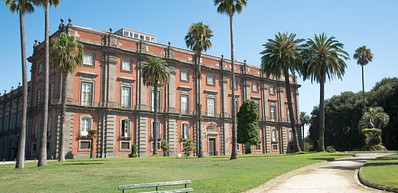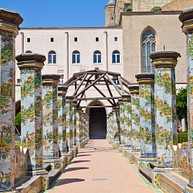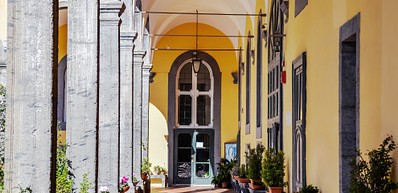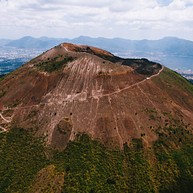
-
![Church of Saint Giovanni a Carbonara, Naples, Italy]() Provided by: Leandro Neumann Ciuffo/CC BY 2.0/Wikimedia
Provided by: Leandro Neumann Ciuffo/CC BY 2.0/Wikimedia

Our travel guides are free to read and explore online. If you want to get your own copy, the full travel guide for this destination is available to you offline* to bring along anywhere or print for your trip.
*this will be downloaded as a PDF.Price
€4,95
Church of Saint Giovanni a Carbonara
The guide was updated:This church and monastery complex is one of the highest-rated in Naples, and you shouldn't miss it if you're interested in art and history. Founded by Augustinian monks in 1343, it was renovated many times throughout history and hosts interesting examples of different art styles, such as its scenographic stairwell entrance built in the 18th century and fascinating sculptures and frescoes.
Useful Information
- Address: Chiesa di San Giovanni a Carbonara, Via Carbonara, 4, Naples
- Opening hours: Mon–Sat 9am–1pm, Sun closed
Digital Travel Guide Download
Our travel guides are free to read and explore online. If you want to get your own copy, the full travel guide for this destination is available to you offline* to bring along anywhere or print for your trip.
*this will be downloaded as a PDF.Price
€4,95

The castle of Capodimonte boasts a wonderful view of the Bay of Naples. Built in the 18th century by Bourbon kings, it has been the royals' summer residence for a long time; today it hosts a museum which exhibits various collections, including masterpieces by Tiziano, Botticelli, Perugino, and Raffaello.
Read more

Castel Nuovo
Castel Nuovo, also known as 'Maschio Angioino', is a medieval castle dating back to 1279. It was an important cultural centre, visited by important artists and writers such as Giotto, Petrarca, and Boccaccio. Today, it hosts various cultural events and is home to the Municipal Museum of Naples.
Read more

Ovo Castle
Literally named 'Egg Castle', Castel dell'Ovo is a 12th-century fortress that dominates the Naples seafront. The name comes from the legendary Roman poet Virgil, who supposedly strengthened the castle walls with a magical egg.
Read more

Basilica of Saint Clare
Not far from the Church of Gesù Nuovo, Basilica di Santa Chiara is a religious complex dating from the 1300s, which includes the Church of Santa Chiara, a monastery, tombs, and a museum, that collects historical documents, sacred relics, and marble statues.
Read more

Basilica of San Lorenzo Maggiore
Basilica di San Lorenzo Maggiore is an extraordinary building complex that mixes Gothic and Baroque architecture and dates back to the end of the 13th century. Every Christmas, a life-size nativity scene is set up inside the church. A museum occupies three floors above the courtyard and exhibits historic items from the monastery as well as archaeological remains.
Read more

Church of Saint Gregory of Armenia
The Chiesa di San Gregorio Armeno is located in the centre of Naples and is a wonderful example of Neapolitan Baroque art. Here you can find beautiful frescoes, gilded ceilings, and cloisters full of orange trees. The church also hosts the relics of Saint Patricia, thus locals often call it 'Chiesa di Santa Patrizia'.
Read more

Church of Gesù Nuovo
When in Naples, don't miss the opulent interior of this church, its Baroque marble statues, its altars inlaid with semi-precious stones, as well as its quirky 1400s stone facade.
Read more

National Archaeological Museum
This is one of the most important archaeological museums in the world: it contains bronzes, sculptures and many other objects from the Bourbon collection, as well as from the historical sites of Pompeii and Ercolano.
Read more

Naples Cathedral
This magnificent Roman Catholic cathedral, known by locals as 'Duomo di Napoli' or 'Cattedrale di Santa Maria Assunta', contains the relics of San Gennaro, the patron saint of Naples. It is also the main church of southern Italy and the seat of the city’s Archbishop.
Read more

Royal Palace of Naples
Built when Naples was under Spanish rule, Palazzo Reale is one of the four royal residences around Naples used by the Bourbon Kings during their reign over the Kingdom of the Two Sicilies. Today, the grand palace and its sprawling grounds are home to the Teatro di San Carlo, the Teatrino di Corte, the National Library, and a captivating museum that offers a glimpse into 17th to 19th-century history through the exquisitely decorated royal apartments. The Royal Gardens, an enchanting sanctuary within, boast tree-lined avenues adorned with rare plants, statues, and hidden gardens, adding to the historical allure of this magnificent landmark.
Read more

Sansevero Chapel Museum
The enigmatic Sansevero Chapel is an important part of the Italian artistic heritage and is located in the historic part of Naples. Here you can see the famous Rococo sculpture of Veiled Christ made by Giuseppe Sanmartino in 1753, as well as a feast of Baroque architecture and a mysterious temple of initiation.
Read more

Fontanelle Cemetery
Located in a tuff cave, Cimitero Delle Fontanelle, also known as the Valley of Death, is an underground cemetery containing the remnants of more than 15,000 Napolitains. A visit to Fontanelle Cemetery offers a somewhat unique — and possibly morbid — experience.
Read more

San Carlo Theatre
This neoclassical theatre looks like it's frozen in time: the majestic golden décor and the red suede curtains will probably throw you back to the 18th century when it was built for Charles III, Duke of Bourbon. After several restorations, it is still open today and hosts great shows such as Swan Lake.
Read more

San Gregorio Armeno Street
This narrow street is all about the nativity scene and teems with tourists and locals. When wandering down Via San Gregorio Armeno, you'll be amazed by the plethora of nativity scene objects lined up along the street. The place is especially popular during Christmas time when everyone is looking for Christmas cribs and figurines.
Read more

Pompeii
When in Naples, you should seize the opportunity to visit Pompeii. Situated to the south of Naples, this city gained fame for having been destroyed and buried by an eruption of Mount Vesuvius in 79 AD. Today, it is one of the most popular tourist destinations in Italy, boasting numerous interesting and, at times, eerie attractions.
Read more

Pausilypon Archaeological Park
This fascinating archaeological site is worth checking out not only for its historical value but also for the majestic view it offers over Naples Bay. The villa, complete with an amphitheatre and thermal baths, was built by Roman knight Publio Vedio Pollione, and its name means 'stress relief'. The place is also known for its cave, which is more than 700 metres deep into the hillside.
Read more

Church of Saint Giovanni a Carbonara
This church and monastery complex is one of the highest-rated in Naples, and you shouldn't miss it if you're interested in art and history. Founded by Augustinian monks in 1343, it was renovated many times throughout history and hosts interesting examples of different art styles, such as its scenographic stairwell entrance built in the 18th century and fascinating sculptures and frescoes.
Read more

See Amalfi Coast
Not far from Naples, the beautiful town of Amalfi is the perfect spot for a one-day excursion: it boasts a stunning seaside and a surprisingly rich history — it used to hold huge maritime power in the Middle Ages — which has left interesting sights such as the St Andrew Cathedral with its scenic staircase. To explore it fully, consider booking a guided tour.
Read more

Bourbon Tunnel
If visiting an ancient underground passage that has served as a war refuge sounds thrilling to you, then don't miss this fascinating archaeological museum in Naples. More than 500 metres long and 150 years old, the Bourbon Tunnel, Tunnel Borbonico, or Bourbon Gallery has been recently restored to the detail and offers experiences for all tastes, from historical tours to speleological excursions.
Read more

Mount Vesuvius
The only active volcano in Continental Europe, Mount Vesuvius is a popular destination for excursions, and offers a stunning panorama over the Naples bay, as well as a thrilling opportunity to look inside its crater. Infamous because it destroyed Pompeii 2,000 years ago, Vesuvius is now carefully controlled by geologists. An interesting choice can be visiting it in the morning — it's only 20 minutes away from Naples — and then heading to the Pompeii archaeological site in the afternoon.
Read more

Capri
With its stunning rock cliffs over a deep blue sea and its polished, upper-class gardens and villas, this beautiful island in front of Sorrento Bay has much to offer. Don't miss the Grotta Azzurra sea cave, in which a play of lights makes the water sparkle with an ethereal blue. Admire the elegant fin-de-siècle architecture of Villa Lysis and the sea view from the terrace, or visit the rocky beaches of Marina Grande and Spiaggia di Faro. Expect the island to be crowded in the summer.
Read more


